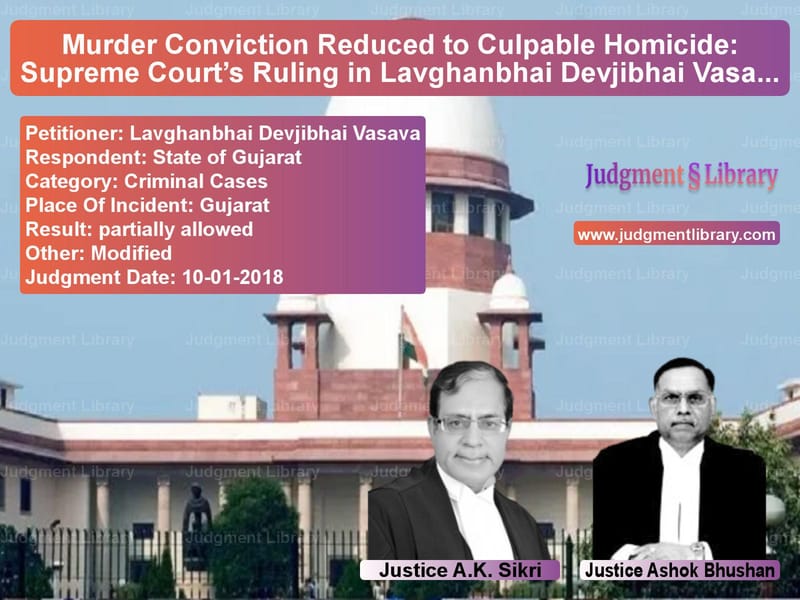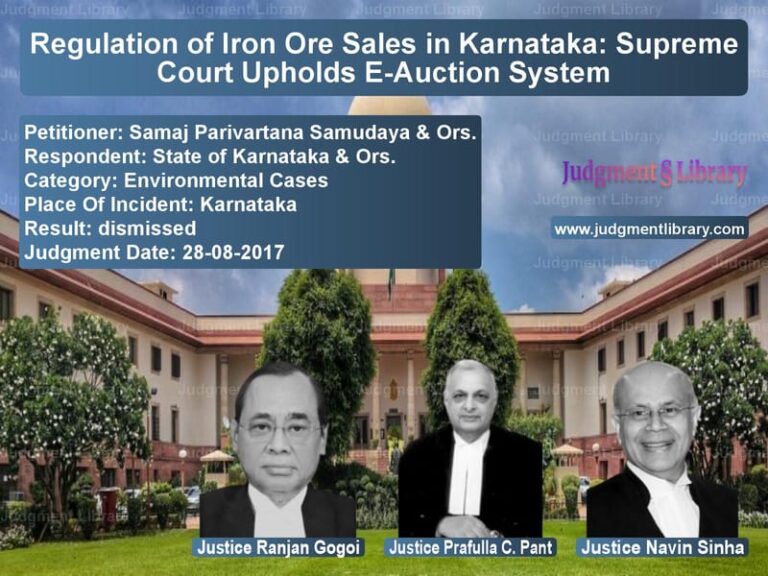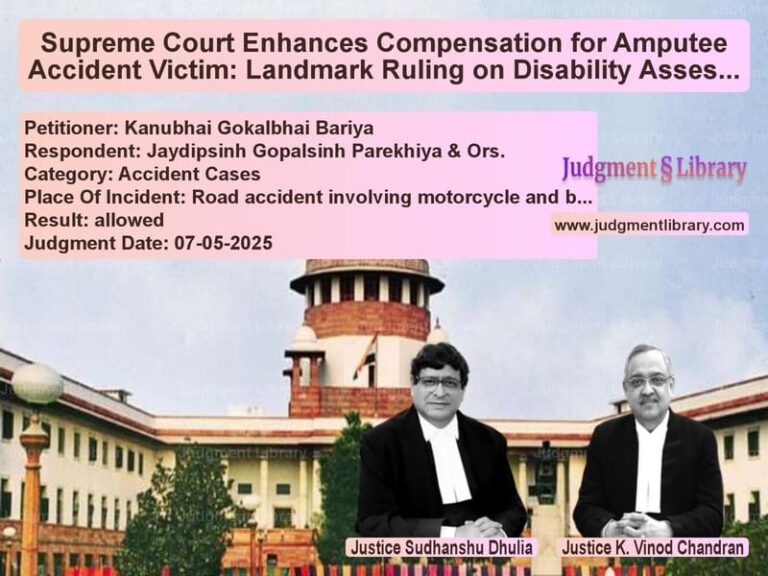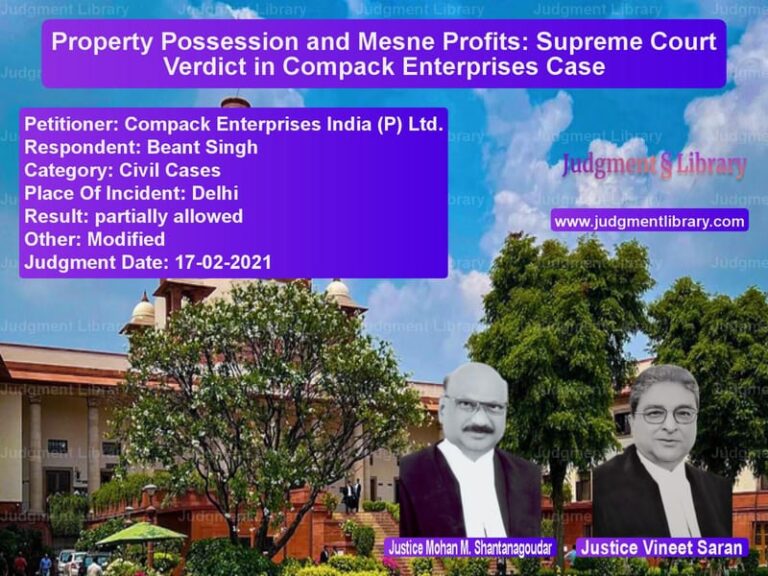Murder Conviction Reduced to Culpable Homicide: Supreme Court’s Ruling in Lavghanbhai Devjibhai Vasava vs. State of Gujarat
The case of Lavghanbhai Devjibhai Vasava vs. State of Gujarat is a significant ruling in criminal law, dealing with the classification of offenses under Section 302 IPC (murder) and Section 304 Part-II IPC (culpable homicide not amounting to murder). The Supreme Court examined whether the conviction of the appellant under Section 302 IPC was justified or should be modified to Section 304 Part-II IPC based on the facts and circumstances of the case.
Background of the Case
The case arose from an incident on March 15, 2008, in Gujarat, where the appellant, Lavghanbhai Devjibhai Vasava, was accused of killing his wife, Shakuben, by striking her on the head with a wooden cot leg.
The key events leading to the Supreme Court proceedings:
- March 15, 2008: The appellant had an altercation with his wife over a delay in preparing lunch. In a fit of rage, he struck her with a wooden cot leg, causing serious head injuries.
- Medical Treatment: The victim was taken to the hospital but succumbed to her injuries ten days later.
- Trial Court Conviction: The appellant was convicted under Section 302 IPC and sentenced to life imprisonment.
- Gujarat High Court Decision: The High Court upheld the conviction.
- Supreme Court Appeal: The appellant challenged the High Court’s decision, arguing that the case did not fall under murder but rather culpable homicide not amounting to murder.
Key Legal Issues
- Whether the act of striking the victim was committed with the intention to kill or was a result of sudden provocation.
- Whether the act met the criteria for murder under Section 302 IPC or should be classified under Section 304 Part-II IPC.
- Whether the quantum of punishment should be reduced based on the facts of the case.
Arguments by the Parties
Arguments by the Appellant (Lavghanbhai Devjibhai Vasava)
- The incident happened in a fit of rage due to a sudden altercation between the husband and wife.
- The appellant did not intend to cause death but acted in the heat of the moment.
- The medical evidence showed that only one blow was inflicted, which indicated an act of sudden provocation.
- There was no history of domestic violence or prior enmity between the couple.
Arguments by the Respondent (State of Gujarat)
- The appellant struck the deceased on the head with a wooden cot leg, a forceful blow that led to her death.
- The nature of the injury indicated that the act was intentional and aimed at a vital part of the body.
- The prosecution argued that the act fulfilled the requirements of Section 302 IPC, as the appellant had knowledge that such a blow could cause death.
Supreme Court’s Observations
On Sudden Provocation
- “The incident took place due to a sudden altercation over a household issue, without any premeditation.”
- “There was no prior enmity between the appellant and the deceased.”
On Nature of Injury
- “Only one blow was inflicted, which indicates that the act was not pre-planned.”
- “The prosecution has not suggested that the relationship between the husband and wife was strained otherwise.”
On Application of Legal Principles
- “The factors to be considered in determining whether an act falls under Section 302 IPC or Section 304 Part-II IPC include: (a) circumstances in which the incident took place, (b) nature of weapon used, (c) whether the attack was aimed at a vital part of the body, (d) the amount of force used, and (e) whether the act was in the heat of passion.”
- “Keeping in view the aforesaid factors, it becomes evident that this case would fall under Section 304 Part-II IPC rather than Section 302 IPC.”
Supreme Court’s Final Judgment
The Supreme Court modified the conviction of the appellant:
- The conviction under Section 302 IPC was set aside and converted to Section 304 Part-II IPC.
- The appellant’s sentence was reduced to the period already served (approximately 9 years and 3 months).
- The appellant was directed to be released forthwith, provided he was not wanted in any other case.
Legal Significance of the Judgment
This ruling establishes key legal principles:
- Distinction Between Murder and Culpable Homicide: The judgment clarifies that sudden altercations leading to death may not always qualify as murder.
- Role of Provocation: The ruling highlights that immediate provocation without premeditation can reduce culpability.
- Judicial Discretion in Sentencing: The decision reflects the Court’s approach in ensuring proportionate punishment based on circumstances and intent.
Conclusion
The Supreme Court’s decision in Lavghanbhai Devjibhai Vasava vs. State of Gujarat reinforces the principle that sudden acts committed in the heat of passion should be treated differently from premeditated crimes. By converting the conviction from murder to culpable homicide, the judgment ensures that the punishment is proportionate to the crime. This ruling serves as an important precedent in cases involving domestic disputes resulting in death.
Don’t miss out on the full details! Download the complete judgment in PDF format below and gain valuable insights instantly!
Download Judgment: Lavghanbhai Devjibha vs State of Gujarat Supreme Court of India Judgment Dated 10-01-2018.pdf
Direct Downlaod Judgment: Direct downlaod this Judgment
See all petitions in Murder Cases
See all petitions in Attempt to Murder Cases
See all petitions in Judgment by A.K. Sikri
See all petitions in Judgment by Ashok Bhushan
See all petitions in partially allowed
See all petitions in Modified
See all petitions in supreme court of India judgments January 2018
See all petitions in 2018 judgments
See all posts in Criminal Cases Category
See all allowed petitions in Criminal Cases Category
See all Dismissed petitions in Criminal Cases Category
See all partially allowed petitions in Criminal Cases Category







